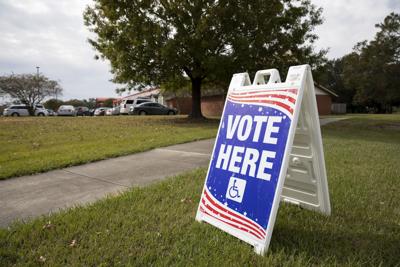One group of Louisiana voters regularly cast ballots without ever going to the polls. And if there's a runoff, they've already made their choices in advance.
In Louisiana, voters on stateside or overseas military duty can request absentee ballots for a full federal cycle — four years — and rank their preferred candidates as their first, second, etc., choices. That applies to presidential, gubernatorial, congressional, City Council, state legislative, judicial and other elections. If a candidate wins a primary, the military voters' alternate choices aren't counted. However, if their first choice doesn't make a runoff, their second choice is calculated into the results.
This form of balloting is called ranked-choice voting, and variations of it are catching on in some American cities and states. This form of voting does away with runoffs. Instead, it eliminates last-place finishers and distributes their voters' second choices among the remaining candidates, in successive rounds of elimination and alternate preferences, until one candidate gets a majority.
Perhaps Louisiana should consider using this form of voting. It could save taxpayers time and money — and potentially spare voters from having to choose between two extremes in a runoff.
In the March 25 primary in Baton Rouge, Covington and New Orleans, ranked-choice voting might have increased voter participation and produced interesting results.
In St. Tammany Parish, for example, 31.2% of the eligible voters cared enough about who would represent them in a four-candidate race for the District D seat on the Covington City Council. All 512 of them made their choices, pushing challenger Jimmy Inman and incumbent Cody Ludwig into an April runoff. Inman got 40% of the vote. Ludwig got 39%. One candidate got 18% of the vote. Another got 3%.
If ranked-choice voting had been available, it's likely that either Ludwig or Inman would already be declared the winner.
Only 14% of East Baton Rouge Parish voters participated in an election to choose a new district judge. Louise Hines Myers, a prosecutor, got 47% of the vote, just shy of a majority. Jordan Faircloth garnered 34%. They'll compete in an April 29 runoff.
With enough second-choice votes, however, Myers or Faircloth might already be getting fitted with a black robe.
On the same day in New Orleans, Backatown Coffee Parlour owner Alonzo Knox beat Sibil Fox Richardson by a margin of 54%-46% in a bitterly contested runoff to succeed state Sen. Royce Duplessis as the new state representative in House District 93. Only 3,161 voters cast ballots.
Had voters known there was one shot to participate, perhaps more would have turned out — and the primary could've occurred on March 25 rather than on the Saturday before Mardi Gras. And, had the candidates known they had only one shot to win voters' support, maybe they would have knocked on every door, even those with an opponent's sign, to ask for a second preference vote.
And maybe they wouldn't have attacked one another so fiercely, for fear of offending each others' supporters and losing potential second-choice votes.
Elsewhere in New Orleans, attorneys Simone Levine and Leon Roche will vie for the Criminal District Court Section A judge seat in the April 29 runoff. They each won about 34% of the vote on March 25. Attorney Diedre Pierce Kelly came in third with 32%. With ranked-choice voting, either Levine or Roche would already have won.
In every election that features more than two candidates, ranked choice voting eliminates the need for expensive runoffs and lets voters pick second, third or more preferences, depending on the number of candidates running. There are various ways to implement ranked-choice voting, but the goal is the same: spare voters the time and expense of runoffs and produce winners with broad-based voter support.
The Louisiana Secretary of State's office says it costs between $1,500 and $2,000 per precinct to administer elections. In New Orleans, with 351 precincts, that runs $526,000 to $702,000. Statewide, with almost 4,000 precincts, a runoff costs taxpayers nearly $8 million. That adds up.
What started as recognition that military personnel abroad needed a chance to vote in the 1990s has blossomed into a whole new way to conduct elections in America.
And it's not a red-versus-blue idea. Heavily Democratic New York City recently used ranked-choice voting to elect a new mayor. Republican strongholds like Alaska and Utah likewise use ranked-choice voting.
I believe ranked-choice voting could give Louisiana citizens better representation with fewer costly elections — and hopefully higher voter turnout.







